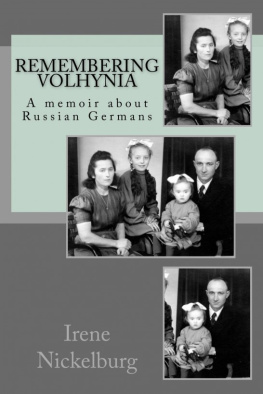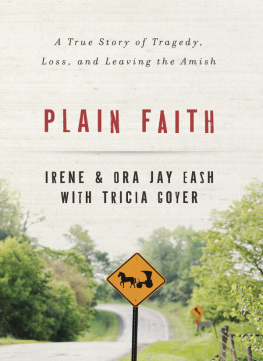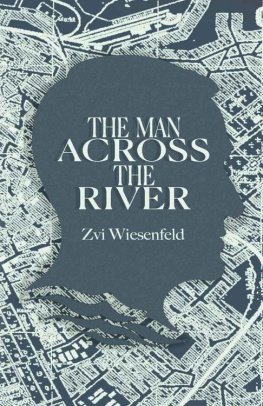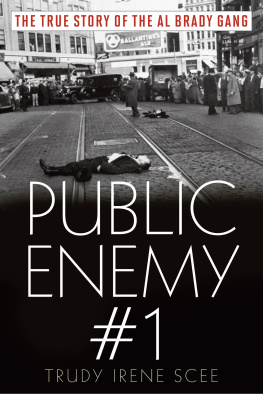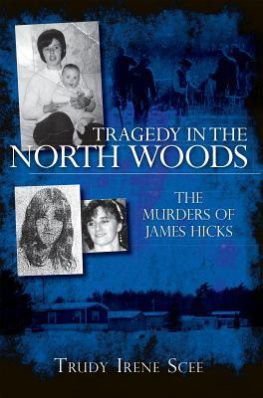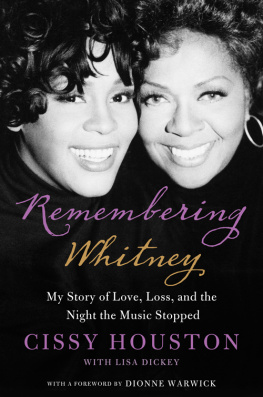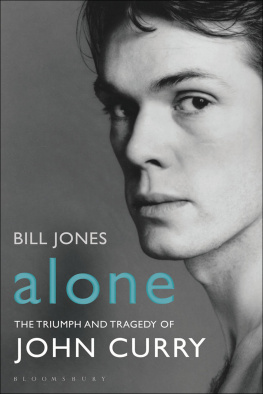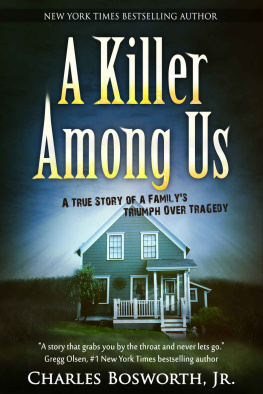Irene Nickelburg - Remembering Volhynia
Here you can read online Irene Nickelburg - Remembering Volhynia full text of the book (entire story) in english for free. Download pdf and epub, get meaning, cover and reviews about this ebook. year: 2014, publisher: Irene Nickelburg, genre: Home and family. Description of the work, (preface) as well as reviews are available. Best literature library LitArk.com created for fans of good reading and offers a wide selection of genres:
Romance novel
Science fiction
Adventure
Detective
Science
History
Home and family
Prose
Art
Politics
Computer
Non-fiction
Religion
Business
Children
Humor
Choose a favorite category and find really read worthwhile books. Enjoy immersion in the world of imagination, feel the emotions of the characters or learn something new for yourself, make an fascinating discovery.
- Book:Remembering Volhynia
- Author:
- Publisher:Irene Nickelburg
- Genre:
- Year:2014
- Rating:4 / 5
- Favourites:Add to favourites
- Your mark:
- 80
- 1
- 2
- 3
- 4
- 5
Remembering Volhynia: summary, description and annotation
We offer to read an annotation, description, summary or preface (depends on what the author of the book "Remembering Volhynia" wrote himself). If you haven't found the necessary information about the book — write in the comments, we will try to find it.
Remembering Volhynia — read online for free the complete book (whole text) full work
Below is the text of the book, divided by pages. System saving the place of the last page read, allows you to conveniently read the book "Remembering Volhynia" online for free, without having to search again every time where you left off. Put a bookmark, and you can go to the page where you finished reading at any time.
Font size:
Interval:
Bookmark:
REMBERINGVOLHYNIA
A memoir
by
Irene Nickelburg
Telling her familys storyabout the plight of the Russian Germans (Volksdeutsche) inEurope.
Copyright 2014 by Irene Nickelburg
All rights reserved.
Published by Irene Nickelburg atSmashwords
This ebook is licensed for your personalenjoyment only. This ebook may not be re-sold or given away toother people. If you would like to share this book with anotherperson, please purchase an additional copy for each person. Ifyoure reading this book and did not purchase it, or it was notpurchased for your use only, then please return it to Smashwordsand purchase your own copy. Thank you for respecting the hard workof this author.
All rights reserved. No part of this book maybe reproduced or transmitted in any form or by any means,electronic or mechanical, including by photocopying, recording, orby any information storage or retrieval system without writtenpermission from the author, except for inclusions or briefquotations in a review. Contact the author at .
Published in the United States
ISBN: 978-0-9898578-9-5
DEDICATION
To my beloved parents
who, despite unspeakable tragediesgrowing
up during the brutal dictatorship of JosephStalin,
never abandoned their faith, their hope,their capacity to love.
ACKNOWLEDGMENTS
First and foremost, I would like to thankthe many members of my family for sharing their personal, intimaterecollections and for giving me permission to write and publishtheir stories.
They were my sister, Gretel Ickert; mybrother, Paul Nickelburg and his wife, Lilli; Lillis mother, NinaDubs; my Aunt Nina Nickelburg; my father Adolf Nickelburg; mymother Herta Gatzke; my cousins Erika Geisler and Ingrid Pedde.
My husband and children always lent theirfull support and assistance as this family saga began to unfold.They encouraged me to take the bold step of publishing this story.They are the loves of my life.
And lastly, I would like to thank Carol vonRaesfeld, my agent and editor, for her insight and expertise inmaking this publication possible.
FOREWORD
I acquired the pieces of the enigmaticpuzzle that made up my parents life story over a period of 50years. As a young child growing up in post WWII Germany, I oftenoverheard my parents private whispered conversations. Their tonewas somber. Words were interspersed with tears as painful memoriesfrom some other life surfaced. I lacked the capacity to understandthe scope of their suffering.
I had what seemed to me to be an uneventful,normal childhood. I always felt loved and cared for within thefolds of my small family. I always had plenty to eat, nice clothesto wear, and even owned expensive toys. I came to America with myfamily aboard the General Langfitt in 1956 and settledquickly into the American way of life. It was easy to pick up thenew language and the new customs. In no time at all I was just likeevery other kid on the block. I grew up, graduated from college,got married, had children and workedfirst as a history teacher andthen as a special education teacher. We enjoyed a comfortablemiddle class life.
Then, one Saturday morning in 1990, as Imade the usual phone call to my aging parents in Ohio, my fatherinformed me with great excitement that I had a brother. I had abrother named Paul who had been repatriated from Kazakhstan and wasnow living in Giessen, Germany with his wife and two children.
My father went on to explain that Paul hadmade an extensive search through the International Red Cross inorder to find him. His own searches with the Red Cross had alwaysbeen a failure, a dead end. My father was overjoyed to have livedlong enough to meet his son and learn about the rest of his family!Paul was able to fill-in-the-blanks for all those lost yearssharing the details of the lives of his first wife, his parents,and his four sisters, all presumed to have perished after WWII.They had all been sent into exile to Kazakhstan. My eighty year oldfather was overcome with emotion as he began to explain thismiraculous news. For nearly fifty years he had longed for answersto questions about his family.
Arrangements were made for Paul and hiswife, Lilli, to come to Ohio to meet the rest of our family. Theday of their arrival at the airport came and we gathered at thegate to greet them. As we stood waiting, I looked over at myfather, whom I loved so dearly, and thought about how blessed I hadbeen to be his child and know a fathers unwavering love. Whattrepidations must Paul be feeling at this moment. He need not haveworried. He already had a place in our hearts.
And then, there they werePaul and Lillidressed in their Sunday best. There was an uncanny familyresemblance and I recognized him immediately. We embraced andkissed. It was so natural. We walked arm-in-arm to our car anddrove home to the feast that our mother was preparing for us. Afterthe lavish meal, Paul lugged his heavy suitcase into the livingroom and began to distribute the presents he had brought all theway from the Soviet Union; a hand carved chess set, a fish-shapeddecanter set, and two exquisite silver samovars. What extravagantgifts!
The following year my two children and Ivisited Paul in Germany and met the rest of his extended family. In1993, my fathers youngest sister, Nina, came to Ohio for amonth-long visit from Lithuania with her husband Jonah. She onlyspoke Russian which made communicating with her more difficult, butI liked her nevertheless and was happy that my father hadreconnected with his family. Three other sisters were still livingin Kazakhstan and he was now able to send them care packages andmoney to help out.
Several years later, Paul and Lilli took meto Lithuania, in the former Soviet Union, to meet the Nickelburgcousins, Aunt Ninas children. They were industrious people workinghard to get established in a new country after being repatriatedfrom Kazakhstan. When I walked into the living room of theirbeautiful stone house, I was flabbergasted to see a large pictureof Half Dome in Yosemite on the wall. We also have a large print ofHalf Dome by Ansel Adams on our living room wall. It was aserendipitous moment.
The irony of our family history wasstartling to me. These people had lived their entire lives inabject poverty, but had been surrounded by a large, loving extendedfamily, while we had lived in affluent America, yet without asingle close relative. Which is the greater poverty?
My father passed away in 1995 and my dearmother came to live with us in New York, bringing with her theentire documentation of their struggle to flee the Stalinist reignof terror. But with family and job commitments, I didnt have timeto look through all the paperwork that was saved in her drawer.
Knowing how lonely she was after spending somany years together with my father, I made a point of having alittle Kaffee Klatsch with her nearly every day. During thoseprivate times together, she began to confide her most painfulmemories to me and I recorded many of those conversations. Ilearned a lot from her during those private talks. I learned thattime does not heal all wounds. Some wounds are so deep, that justlike a piece of shrapnel, they can cause excruciating pain whenre-examined.
I once took my mother on a Sunday afternoonouting to the Schuyler Mansion on the banks of the Hudson Rivernear Schuylerville, New York. We were taking a guided tour of thisearly 19th century residence when my mother began tocry.
Mom, I said, whats wrong? Why are youcrying?
She answered that the kitchen reminded herof their farm in Ukraine before the communists took it away. Thebutter churn, the implements, and most of all, the spinning wheellooked just like the ones they had owned so long ago. Her familyhad lived on that farm in the 1920s, not the 1820s. What primitiveconditions those must have been!
Next pageFont size:
Interval:
Bookmark:
Similar books «Remembering Volhynia»
Look at similar books to Remembering Volhynia. We have selected literature similar in name and meaning in the hope of providing readers with more options to find new, interesting, not yet read works.
Discussion, reviews of the book Remembering Volhynia and just readers' own opinions. Leave your comments, write what you think about the work, its meaning or the main characters. Specify what exactly you liked and what you didn't like, and why you think so.

